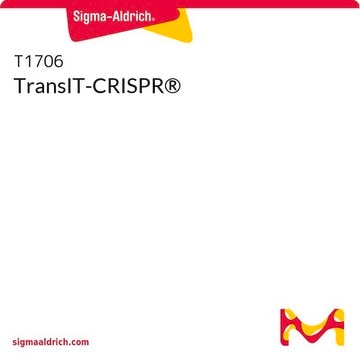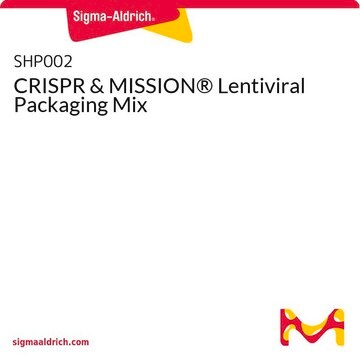CRISPR
CRISPR/Cas9 Products and Services
Design and order CRISPR gRNA, Cas9, screening libraries, controls and companion products. Formats include plant, lentivirus, IVT-RNA, plasmid, synthetic, and protein.
Synonym(s):
CRISPR, CRISPRs, Cas9, Crispr RNA, Crispr/Cas System
Sign Into View Organizational & Contract Pricing
All Photos(1)
About This Item
UNSPSC Code:
12352200
Recommended Products
recommended
related product
Product No.
Description
Pricing
Customers Also Viewed
Hirotaka Ebina et al.
Scientific reports, 3, 2510-2510 (2013-08-27)
Even though highly active anti-retroviral therapy is able to keep HIV-1 replication under control, the virus can lie in a dormant state within the host genome, known as a latent reservoir, and poses a threat to re-emerge at any time.
Marian L Burr et al.
Cancer cell, 36(4), 385-401 (2019-10-01)
Loss of MHC class I (MHC-I) antigen presentation in cancer cells can elicit immunotherapy resistance. A genome-wide CRISPR/Cas9 screen identified an evolutionarily conserved function of polycomb repressive complex 2 (PRC2) that mediates coordinated transcriptional silencing of the MHC-I antigen processing
Takehito Kaneko et al.
Scientific reports, 4, 6382-6382 (2014-10-02)
Engineered endonucleases, such as zinc-finger nucleases (ZFNs), transcription activator-like effector nucleases (TALENs), and the clustered regularly interspaced short palindromic repeat (CRISPR)/CRISPR-associated (Cas) system, provide a powerful approach for genome editing in animals. However, the microinjection of endonucleases into embryos requires
Le Cong et al.
Science (New York, N.Y.), 339(6121), 819-823 (2013-01-05)
Functional elucidation of causal genetic variants and elements requires precise genome editing technologies. The type II prokaryotic CRISPR (clustered regularly interspaced short palindromic repeats)/Cas adaptive immune system has been shown to facilitate RNA-guided site-specific DNA cleavage. We engineered two different
Joshua R York et al.
Developmental biology, 453(2), 180-190 (2019-06-19)
A major challenge in vertebrate evolution is to identify the gene regulatory mechanisms that facilitated the origin of neural crest cells and placodes from ancestral precursors in invertebrates. Here, we show in lamprey, a primitively jawless vertebrate, that the transcription
Our team of scientists has experience in all areas of research including Life Science, Material Science, Chemical Synthesis, Chromatography, Analytical and many others.
Contact Technical Service

















